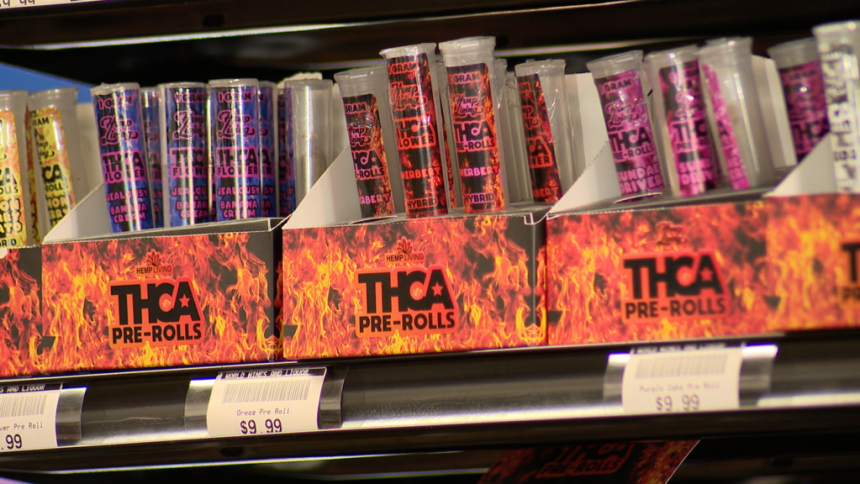THC-A pre-rolls in a shop. (Photo by WEWS.)
Ohioans will still be able to have and use “intoxicating” hemp, low-level THC products such as delta 8, during the state’s temporary ban — but it would be illegal to sell it.
Last Wednesday, Gov. Mike DeWine announced in a news conference a state of emergency starting today (Tuesday, Oct. 14) due to the “availability and abuse of intoxicating hemp products remains a serious threat to public health and safety.”
What is intoxicating hemp? What is delta 8, delta 9?
Delta 8 and 9 are cannabinoids produced by the cannabis plant, often manufactured by CBD.
Ohio doesn’t have an age requirement to buy them since it is .3% or less of THC.
Thus, hemp products can be sold almost anywhere in the state, and the government has no jurisdiction over them.
How long has hemp been legal?
Congress’s Agriculture Improvement Act of 2018 allowed for hemp products to be sold as long as they have .3% THC or less.
U.S. Customs and Border Protection issued guidance on their website that under the law, the Drug Enforcement Administration no longer has the authority to seize and criminalize sending or buying seeds with less than .3% THC.
The DEA has also given this statement to numerous attorneys around the country with the same advice, including specifically addressing cannabis.
What is this executive order? What does it apply to?
According to the order, all consumer products containing intoxicating hemp must be removed from public display by all retailers, no consumer products containing intoxicating hemp may be sold or offered for sale during the state of emergency and any retailer who has intoxicating hemp must segregate these units from other merchandise and hold them, or a portion of them, for law enforcement officers or officials of the department of agriculture.
The ban lasts for 90 days.
This means there is a full removal.
Any intoxicating hemp product that isn’t regulated by the state’s marijuana division must be pulled from smoke shops, breweries, convenience stores, or anywhere else they are sold.
This even includes unregulated hemp products sold in marijuana dispensaries, the governor’s team told us.
“This is specifically aimed at synthetic, intoxicating hemp products that can be sold to kids, have no quality control and are simply dangerous,” DeWine said during the press conference.
Can I still buy hemp products by mail?
Case Western Reserve University law professor emeritus Jonathan Entin explained that this is a tricky question.
“Typically, states don’t get to regulate out-of-state actors unless those actors are physically present in the state or the state can say, ‘You have sufficient practical contact with the state that we can regulate you,’” Entin said.
With regard to mail-order sales, the governor’s team said that online sellers must follow state law and not sell to Ohio residents.
If this is about public safety, why not ban alcohol, tobacco and marijuana, too?
All are regulated markets, DeWine and his team said.
“As far as alcohol, it’s totally, it has been regulated, historically, from the state of Ohio,” DeWine said. “We regulate it. The person who is serving that beer, they can lose their license if they’re serving to a minor — that’s the difference.”
Will this ban really last 90 days?
There is only one way it doesn’t.
“The executive order itself is unconstitutional,” Dakota Sawyer, who represents hemp sellers, said.
Titan Logistic Group, Fumee Smoke and Vape and Invicta Partners filed a lawsuit in the Franklin County Court of Common Pleas, saying DeWine is breaking federal and state law by restricting access to these products.
They add that he doesn’t have the authority to make this order, either.
The lawsuit asks a judge to block the state’s ban before it goes into effect.
Can I get in trouble for possessing hemp products during the prohibition?
No. The executive order only bans selling.
Retailers who continue selling intoxicating hemp could be fined $500 each day the products remain on sale. The state will have the authority to seize products if they are still available for sale.
Follow WEWS statehouse reporter Morgan Trau on X and Facebook.
This article was originally published on News5Cleveland.com and is published in the Ohio Capital Journal under a content-sharing agreement. Unlike other OCJ articles, it is not available for free republication by other news outlets as it is owned by WEWS in Cleveland.
SUBSCRIBE: GET THE MORNING HEADLINES DELIVERED TO YOUR INBOX









